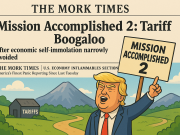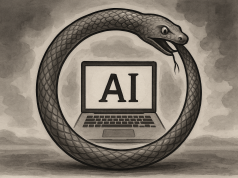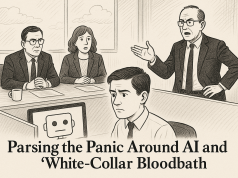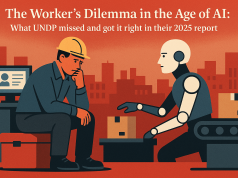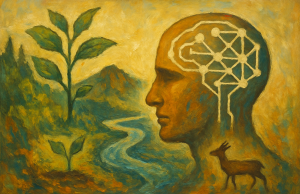As dawn breaks on an era brimming with technological innovation, the very contours of our professional landscapes are being redrawn beneath our feet. In the echelons of the workforce, whispers of artificial intelligence (AI), automation, and digital transformation crescendo into a symphony of change. This transformation is not merely a backdrop; it’s a powerful actor that compels us to rethink the core of our work identities and societal fabric. At The Work Times, we position ourselves at the vanguard of this conversation, dissecting and disseminating insights for a discerning readership akin to those of the Washington Post, The New Yorker, and The New York Times.
Our dialogue today centers on the symbiosis of our humanity with the relentless march of technology, all under the watchful eye of policy. The questions are weighty and their answers complex: How will AI and automation script the narrative of job availability and security? What sociopolitical scaffolding is imperative to uphold fair work conditions and safeguard against an expanding chasm of inequality? And amidst the silicon heartbeat of a digitized domain, how do we sustain the organic pulse of our human essence?
In the quest to illuminate pathways through this labyrinth, we must acknowledge that AI and automation serve as both architects and demolishers of opportunity. A brave new world of work emerges, freeing human hands from monotonous tasks yet casting a penumbra of uncertainty over traditional livelihoods. As industries pivot and morph, we discern the emergence of new roles — roles that demand a recalibration of skills and a renaissance in education and training.
Concurrently, the mantle of policymaking has never been more paramount. To voyage through these uncharted waters without a compass of comprehensive labor policies and ethical frameworks is to invite a storm of inequity and disenfranchisement. It is incumbent upon our leaders and decision-makers to weave a safety net that not only catches those displaced but also propels them into the currents of new opportunity. This tapestry of policy must reconcile the efficiencies yielded by machines with the welfare of the human spirit.
To anchor this journey, The Work Times calls upon a confluence of voices: leaders with the foresight to steer us through this transition, policymakers with the acumen to draft charters of balance and fairness, and workers with the lived experience to ground our discourse in reality. It is a dialogue that transgresses industries and borders, for the ripples of these changes are felt in every office, factory, and virtual space.
We extend an invitation to each one of you — be you a titan of industry or a denizen of the gig economy — to partake in this pivotal conversation. Let us chart a course through the digital expanse where progress is anchored in protection, innovation is laced with inclusion, and efficiency dovetails with empathy. Together, we can forge a future of work that is not only productive but also humane and just, ensuring an ecosystem of work that is equitable, ethical, and empowering for every individual.
Join us as we herald a new manifesto for work, one where each advance is a stride toward shared prosperity and the dignity of every worker is the measure of our progress.















